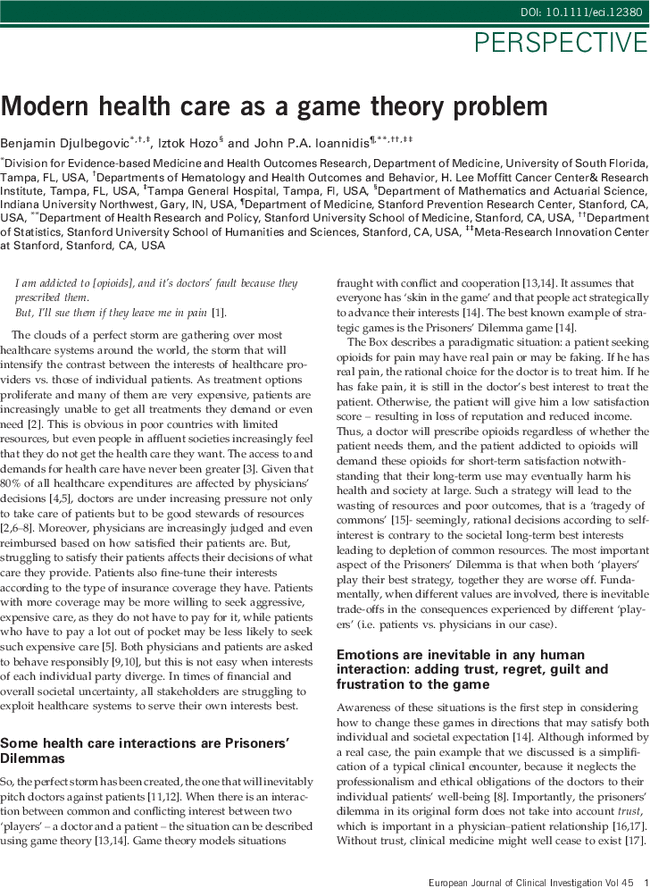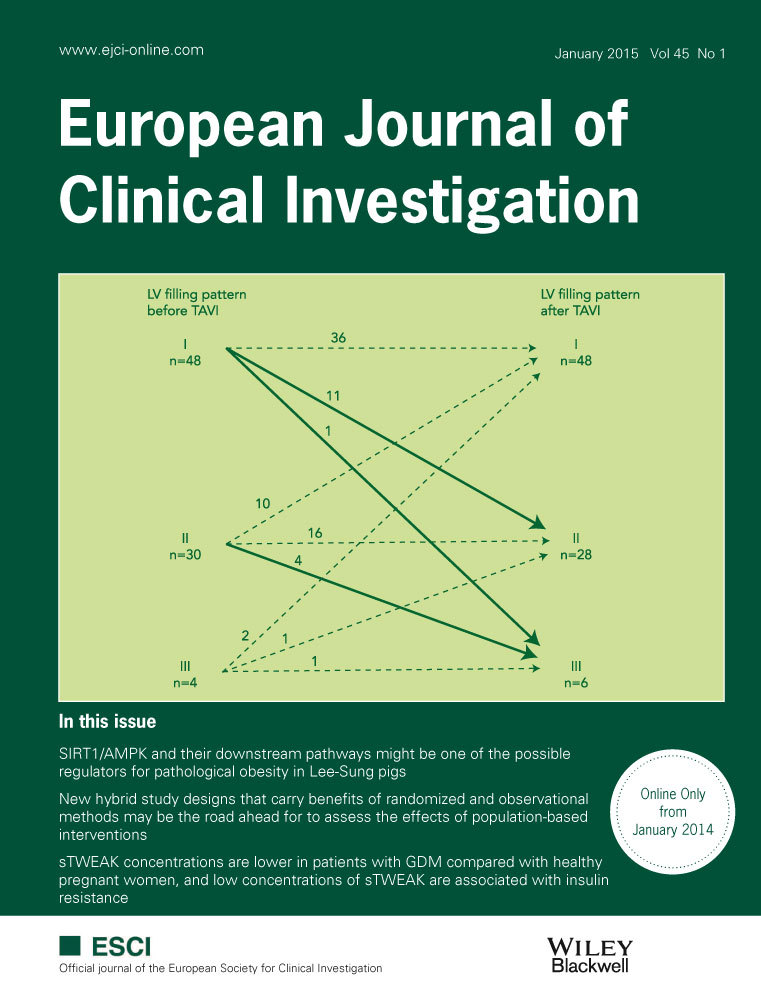Modern health care as a game theory problem
Corresponding Author
Benjamin Djulbegovic
Division for Evidence-based Medicine and Health Outcomes Research, Department of Medicine, University of South Florida, Tampa, FL, USA
Departments of Hematology and Health Outcomes and Behavior, H. Lee Moffitt Cancer Center& Research Institute, Tampa, FL, USA
Tampa General Hospital, Tampa, Fl, USA
Correspondence to: Dr Benjamin Djulbegovic, Comparative Effectiveness Research Program, Division of Evidence-based Medicine, Department of Internal Medicine, University of South Florida & H. Lee Moffitt Cancer Center & Research Institute, 3515 East Fletcher Avenue, MDC 27, Tampa, FL 33612, USA. Tel.: 813 396 2349; fax: 813 905 8909; e-mail: [email protected]Search for more papers by this authorIztok Hozo
Department of Mathematics and Actuarial Science, Indiana University Northwest, Gary, IN, USA
Search for more papers by this authorJohn P.A. Ioannidis
Department of Medicine, Stanford Prevention Research Center, Stanford, CA, USA
Department of Health Research and Policy, Stanford University School of Medicine, Stanford, CA, USA
Department of Statistics, Stanford University School of Humanities and Sciences, Stanford, CA, USA
Meta-Research Innovation Center at Stanford, Stanford, CA, USA
Search for more papers by this authorCorresponding Author
Benjamin Djulbegovic
Division for Evidence-based Medicine and Health Outcomes Research, Department of Medicine, University of South Florida, Tampa, FL, USA
Departments of Hematology and Health Outcomes and Behavior, H. Lee Moffitt Cancer Center& Research Institute, Tampa, FL, USA
Tampa General Hospital, Tampa, Fl, USA
Correspondence to: Dr Benjamin Djulbegovic, Comparative Effectiveness Research Program, Division of Evidence-based Medicine, Department of Internal Medicine, University of South Florida & H. Lee Moffitt Cancer Center & Research Institute, 3515 East Fletcher Avenue, MDC 27, Tampa, FL 33612, USA. Tel.: 813 396 2349; fax: 813 905 8909; e-mail: [email protected]Search for more papers by this authorIztok Hozo
Department of Mathematics and Actuarial Science, Indiana University Northwest, Gary, IN, USA
Search for more papers by this authorJohn P.A. Ioannidis
Department of Medicine, Stanford Prevention Research Center, Stanford, CA, USA
Department of Health Research and Policy, Stanford University School of Medicine, Stanford, CA, USA
Department of Statistics, Stanford University School of Humanities and Sciences, Stanford, CA, USA
Meta-Research Innovation Center at Stanford, Stanford, CA, USA
Search for more papers by this author
References
- 1Lembke A. Why doctors prescribe opioids to known opioid abusers. N Engl J Med 2012; 367: 1580–1.
- 2Caplan AL. Will evidence ever be sufficient to resolve the challenge of cost containment? J Clin Oncol 2011; 29: 1946–8.
- 3 The World Health Organization. The World Health Report 2008 – primary Health Care (Now More Than Ever). In: TWH, editor. Report-2008. Geneva: The World Health Organization; 2008.
- 4Cassel CK, Guest JA (2012) Choosing Wisely: helping physicians and patients make smart decisions about their care. JAMA 2012; 307: 1801–2.
- 5Whaley C, Schneider Chafen J, Pinkard S, Kellerman G, Bravata D, Kocher R et al. Association between availability of health service prices and payments for these services. JAMA 2014; 312: 1670–6.
- 6Paterniti DA, Fancher TL, Cipri CS, Timmermans S, Heritage J, Kravitz RL. Getting to “no”: strategies primary care physicians use to deny patient requests. Arch Intern Med 2010; 170: 381–8.
- 7Gawande AA, Colla CH, Halpern SD, Landon BE. Avoiding low-value care. N Engl J Med 2014; 370: e21.
- 8Snyder L. American College of Physicians Ethics Manual. Sixth Edition. Ann Intern Med 2012; 156: 73–104.
- 9Henry MS. Uncertainty, responsibility, and the evolution of the physician/patient relationship. J Med Ethics 2006; 32: 321–3.
- 10Brook RH. Rights and responsibilities in health care: striking a balance. JAMA 2010; 303: 2289–90.
- 11Cutler DM. WHo benefits from health system change? JAMA 2014; 312: 1639–41.
- 12Reinhardt UE. Health care price transparency and economic theory. JAMA 2014; 312: 1642–3.
- 13Djulbegovic B, Hozo I. When is it rational to participate in a clinical trial? a game theory approach incorporating trust, regret and guilt. BMC Med Res Methodol 2012; 12: 85.
- 14McAdams D. Game-Changer. Game Theory and the Art of Transforming Strategic Situations. New York: W.W. Norton & Company; 2014.
- 15Hardin G. The tragedy of the commons. Science 1968; 162: 1243–8.
- 16Calnan M, Rowe R. Trust relations in a changing health service. J Health Serv Res Policy 2008; 13: 97–103.
- 17Pellegrino ED, Veatch RM, Langan J. Ethics, Trust, and the Professions: Philosophical and Cultural Aspects. Washington, D.C.: Georgetown University Press; 1991: xiv, p 284.
- 18Djulbegovic B, Hozo I. When should potentially false research findings be considered acceptable? PLoS Med 2007; 4: e26.
- 19Djulbegovic B, Hozo I, Schwartz A, McMasters K. Acceptable regret in medical decision making. Med Hypotheses 1999; 53: 253–9.
- 20Hozo I, Djulbegovic B. When is diagnostic testing inappropriate or irrational? Acceptable regret approach. Med Decis Making 2008; 28: 540–53.
- 21Gérvas J, Heath H, Durán A, Gené J, MotSoI. Clinical prevention: patients’ fear and the doctor's guilt. Eur J Gen Pract 2009; 15: 122–4.
- 22Dizon DS. Guilt and the burden on oncology providers. Oncologist 2014; 19: 441–2.
- 23Dixit A, Skeath S. Games of Strategy. 2nd ed. New York: W.W.Norton; 2004.
- 24Eatwell J, Milgate J, Newman P. Game Theory. New York: WW Norton; 1989.
10.1007/978-1-349-20181-5 Google Scholar
- 25Roberts RG. Seven reasons family doctors get sued and how to reduce your risk. Fam Pract Manag 2003; 10: 29–34.
- 26Schwartz AL, Landon BE, Elshaug AG, Chernew ME, McWilliams J. Measuring low-value care in medicare. JAMA Intern Med 2014; 174: 1067–76.
- 27Bell DE. Regret in decision making under uncertainty. Oper Res 1982; 30: 961–81.
- 28Snijders C, Keren G. Determinants of trust. In: DV Budescu, I Erev, R Zwick, editors. Games and Human Behavior. Mahwah, NJ: Lawrence Erbaum Associates, Inc.; 1999: pp 355–83.
- 29Pauker SG, Kassirer J. The threshold approach to clinical decision making. N Engl J Med 1980; 302: 1109–17.
- 30Pauker SG, Kassirer JP. Therapeutic decision making: a cost benefit analysis. N Engl J Med 1975; 293: 229–34.
- 31Djulbegovic B, Hozo I, Lyman G. Linking evidence-based medicine therapeutic summary measures to clinical decision analysis. MedGenMed 2000; Available at: http://www.medscape.com/Medscape/GeneralMedicine/journal/2000/v2002.n2001/mgm0113.djul/mgm0113.djul-2001.html. Accessed on 3 December 2014.
- 32DeKay ML, Asch DA. Is the defensive use of diagnostic tests good for patients, or bad? Med Decis Making 1998; 18: 19–28.
- 33Ioannidis JP. Why most published research findings are false. PLoS Med 2005; 2: e124.
- 34Djulbegovic B, Hozo I, Greenland S. Uncertainty in clinical Medicine. In: F Gifford, editor. Philosophy of Medicine (Handbook of the Philosophy of Science). London: Elsevier; 2011: pp 299–356.
10.1016/B978-0-444-51787-6.50011-8 Google Scholar
- 35Rowe R, Calnan M. Trust relations in health care—the new agenda. Eur J Public Health 2006; 16: 4–6.
- 36Calnan MW, Sanford E. Public trust in health care: the system or the doctor? Qual Saf Health Care 2004; 13: 92–7.
- 37Simone J. The rise & fall of trust in the medical profession. Oncol Times 2007; 29: 4–6.
- 38 The Joint Commission (2014). Available at: http://www.jointcommission.org/topics/pain_management.aspx. Accessed on 3 December 2014.
- 39Berenson RA, Kaye DR. Grading a physician's value — the misapplication of performance measurement. N Engl J Med 2013; 369: 2079–81.
- 40Berenson RA, Pronovost PJ, Krumholz HM. Achieving the Potential of Health Care Performance Measures. Washington, DC: Urban Institute: Robert Wood Johnson Foundation; 2013.




